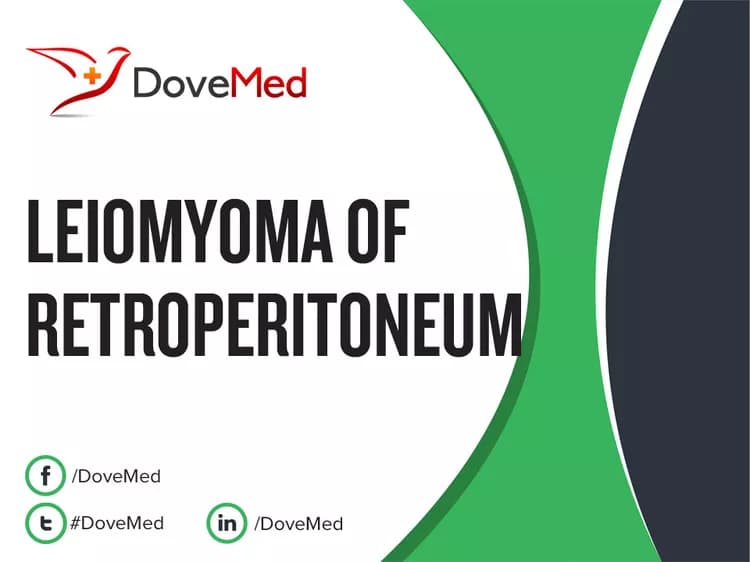What are the other Names for this Condition? (Also known as/Synonyms)
- Retroperitoneal Leiomyoma
What is Leiomyoma of Retroperitoneum? (Definition/Background Information)
- Leiomyoma of Retroperitoneum is a benign, smooth muscle tumor that occurs on the retroperitoneum (abdominal cavity or space behind the peritoneum). A leiomyoma is a benign smooth muscle tumor that can develop anywhere in the body
- These slow-growing, solitary tumors are extremely infrequent and have a tendency to grow to enormous sizes. Retroperitoneal Leiomyomas are much more common in women than men
- The treatment of choice is a surgical removal of the entire tumor. The prognosis is excellent with appropriate treatment
Who gets Leiomyoma of Retroperitoneum? (Age and Sex Distribution)
- Leiomyoma of Retroperitoneum is present in women around menopause. These abdominal cavity tumors are almost exclusively found in women (average age 45 years)
- There is no geographical, racial, or ethnic preference noticed
What are the Risk Factors for Leiomyoma of Retroperitoneum? (Predisposing Factors)
- No risk factors are evident for Leiomyoma of Retroperitoneum
- Nevertheless, women with uterine leiomyomas (uterine fibroids) may be at an increased risk for abdominal leiomyomas
It is important to note that having a risk factor does not mean that one will get the condition. A risk factor increases ones chances of getting a condition compared to an individual without the risk factors. Some risk factors are more important than others.
Also, not having a risk factor does not mean that an individual will not get the condition. It is always important to discuss the effect of risk factors with your healthcare provider.
What are the Causes of Leiomyoma of Retroperitoneum? (Etiology)
- The exact cause of Leiomyoma of Retroperitoneum occurrence is unknown
- Research is being performed to understand the causative factors of this rare tumor
What are the Signs and Symptoms of Leiomyoma of Retroperitoneum?
The signs and symptoms of Leiomyoma of Retroperitoneum include:
- It is present as a solid mass of solitary tumor, mostly growing deep inside the body
- These tumors can develop to huge sizes over many years (about 30cm wide, 10lbs in weight)
- Mostly, these tumors appear as painless masses. Pain may occur, if a nerve is pressed near the tumor
In the retroperitoneal space, the tumor may not cause any symptoms for a long period of time, until it grows to a large size and compresses the adjacent organs in the abdomen. This is one of the reasons why retroperitoneal tumors remain undetected during their early development stage
How is Leiomyoma of Retroperitoneum Diagnosed?
Leiomyoma of Retroperitoneum diagnosis may involve:
- Complete physical examination with thorough evaluation of medical history
- Ultrasound, CT, MRI scans of the abdomen
- Needle biopsy of tumor: A needle biopsy may not be helpful, because one may not be able to visualize the different morphological areas of the tumor. Hence, a needle biopsy as a diagnostic tool has certain limitations, and an open surgical biopsy is preferred
- Open biopsy of tumor: A tissue biopsy is performed and sent to a laboratory for a pathological examination, who examines the biopsy under a microscope. After putting together clinical findings, special studies on tissues (if needed) and with microscope findings, the pathologist arrives at a definitive diagnosis
- Differential diagnosis, to eliminate other tumor types is considered, before arriving at a definitive diagnosis
Many clinical conditions may have similar signs and symptoms. Your healthcare provider may perform additional tests to rule out other clinical conditions to arrive at a definitive diagnosis.
What are the possible Complications of Leiomyoma of Retroperitoneum?
The possible complications of Leiomyoma of Retroperitoneum include:
- Large tumors in the retroperitoneal cavity can result in weight loss, abdominal pain, frequent urination, and kidney failure due to compression of the kidney
- Damage of vital nerves, blood vessels, and surrounding structures, during surgery to remove to remove Retroperitoneal Leiomyomas
- Stress and anxiety
How is Leiomyoma of Retroperitoneum Treated?
Following are the treatment methods adopted for Leiomyoma of Retroperitoneum:
- Complete excision and removal of the tumor with clear margins is normally sufficient treatment
- Post-operative care is important: One must maintain minimum activity levels, until the surgical wound heals
- Follow-up care with regular screening and check-ups are important, since the tumor can recur in some cases
How can Leiomyoma of Retroperitoneum be Prevented?
Current medical research has not established a way of preventing Leiomyoma of Retroperitoneum.
What is the Prognosis of Leiomyoma of Retroperitoneum? (Outcomes/Resolutions)
- The prognosis of Leiomyoma of Retroperitoneum is generally excellent on surgical excision and removal of the tumor
- However, periodic follow-up check-ups with screening may be required
Additional and Relevant Useful Information for Leiomyoma of Retroperitoneum:
The following DoveMed website link is a useful resource for additional information:
Related Articles
Test Your Knowledge
Asked by users
Related Centers
Related Specialties
Related Physicians
Related Procedures
Related Resources
Join DoveHubs
and connect with fellow professionals


0 Comments
Please log in to post a comment.